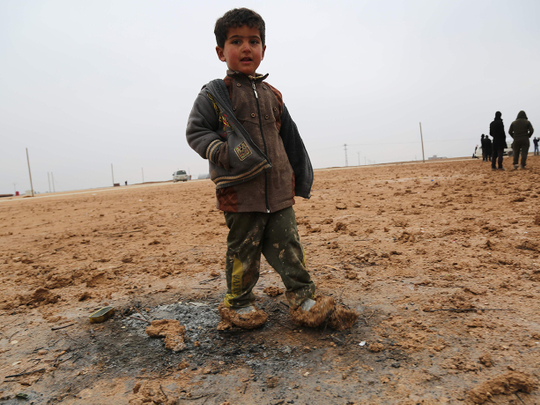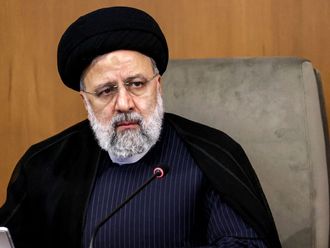Dubai: The UAE announced the provision of Dh503m, ($137m) during the country’s participation in the fourth Syria donors’ conference.
World leaders gathered in London on Thursday to pledge billions of dollars in aid for refugees fleeing Syria’s civil war, in an attempt to contain the deepening migration crisis on Europe’s borders.
Representatives from 60 countries and international organisations - including German Chancellor Angela Merkel, UN Secretary General Ban Ki- Moon and US secretary of state John Kerry - were aiming to commit $9bn in additional humanitarian aid to Syrians over the next four years.
Shaikha Lubna Al Qassimi, Minister of Development and International Cooperation, President of the UAE’s Committee on Foreign Humanitarian Aid, led the UAE’s delegation to the conference.
She said that with the Syrian crisis entering its fifth year, holding such conferences, whose direct results are seen every day, has become an absolute necessity in order to reduce the pain and preserve the human dignity of the Syrian people.
UAE humanitarian aid to affected Syrians since 2012 has exceeded Dh 2.2 billion, the equivalent of $600 million, which constitutes about 0.15 per cent of the UAE’s gross national income. The value of UAE aid directed to Syrian refugees in the hosting countries and the neighbourhood to Syria amounted to Dh2 billion.
Any optimism over the amount expected to be committed by donors, however, was tempered by the news that peace talks in Geneva, seeking a diplomatic resolution to the brutal five-year conflict, had broken down.
The money raised at the London conference will be primarily directed towards Jordan, Lebanon and Turkey, which are struggling to cope with the exodus of refugees coming across the border from Syria.
Underlining the desperate situation on the ground in Syria, Turkish Prime Minister Ahmet Davutoglu told the meeting that tens of thousands of Syrians were on the move towards his country to escape aerial bombardments on the city of Aleppo.
“Sixty to seventy thousand people in the camps in north Aleppo are moving towards Turkey. My mind is not now in London, but on our border — how to relocate these new people coming from Syria?” he said. “Three hundred thousand people living in Aleppo are ready to move towards Turkey.” Turkey is already hosting more than 2.5 million Syrian refugees. Jordan and Lebanon are the other countries bearing the brunt of the Syrian refugee exodus.
“Looking into the eyes of my people, and seeing the hardship and distress they carry, I must tell you we have reached our limit,” said Jordan’s King Abdullah.
Several speakers also made the point that while the situation of refugees was bad, that of Syrians trapped inside the country enduring bombardments, sieges and, in some places, starvation was far worse.
United Nations agencies are appealing for $7.73 billion (Dh19.2 billion) to cope with the Syrian emergency this year, and countries in the region are asking for an additional $1.2 billion.
Conference co-hosts Britain, Norway and Germany were the first to announce their pledges.
Britain promised an extra $1.76 billion by 2020, raising its total commitment to $3.36 billion.
Norway pledged $1.17 billion over the next four years, while Germany said it would give $2.57 billion by 2018.
The almost five-year-old conflict has killed an estimated 260,000 people and stoked the spread of Daesh across the Middle East and North Africa.
For European nations, improving the humanitarian situation in Syria and neighbouring countries is crucial to reducing incentives for Syrians to travel to Europe, where a large refugee influx has put many countries under severe strain.
“The German government is convinced the refugee movements can be solved by fighting their reason for leaving.
London is a major step to come closer to this aim,” German Chancellor Angela Merkel told reporters at the conference.
A UN envoy halted his attempts to conduct Syrian peace talks on Wednesday after the Syrian army, backed by Russian air strikes, advanced against rebel forces north of Aleppo, choking opposition supply lines from Turkey to the city.
Arriving at the London conference, US Secretary of State John Kerry said Russia had a responsibility to live up to its UN commitment to allow access to humanitarian aid and to cease attacks on Syrian civilians.
Kerry said he had spoken to his Russian counterpart Sergei Lavrov and the pair had agreed on the need to discuss how to achieve a ceasefire in Syria.
The conference will focus particularly on the need to provide an education for displaced Syrian children and job opportunities for adults, reflecting growing recognition that the fallout from the Syrian war will be very long-term.
Other options
The Support Syria conference in London has been presented as the only way — apart from an end to the war — of stemming the flow of Syrian refugees to Europe. The British government is pushing for a huge increase in aid to transit countries such as Jordan, as a quid pro quo for letting more Syrians enter those countries’ labour markets. The hope is that more work will persuade more Syrians to stay in the Middle East.
This aid is much needed, but it is optimistic to expect it alone to curb the flow of refugees to Europe. The jobs the aid will encourage may be comparatively few in number and offer Syrians no more than they can already earn on the black market. They will not be created — if at all — for several months. In order to manage the refugee crisis, the international community also needs to pursue several other approaches — namely:
1. Increase mass resettlement
Fearing domestic uproar, European leaders have resisted resettling significant numbers of refugees from places like Jordan. But over a million have now arrived regardless — in part because they have lost faith in the formal processes of resettlement.
Given that it is physically and legally impossible to prevent their passage, it therefore makes sense to at least slow and manage their arrival by offering them a realistic chance of resettlement.
This would encourage refugees tempted to smuggle themselves to Greece to bide their time on the other side of the Mediterranean, since they would now have the prospect of getting to Europe in a safer manner.
Andrew Harper, head of the UN refugee agency in Jordan, said his colleagues noticed more refugees promising to remain in Jordan once Canada pledged to resettle 25,000 Syrians — increasing the possibility that more people could start a new life in the west. “If there is a possibility of not putting their families’ lives at risk, they will choose that,” said Harper. “If it doesn’t work out, then they may make a move.”
2. Enact a European asylum policy
While European countries are still signatories to the 1951 UN refugee convention — one of the crowning achievements of the post-Holocaust era — they all have a duty to provide sanctuary to refugees.
While they each operate different asylum systems and policies, some countries will bear heavier parts of the burden than others, since refugees will naturally gravitate towards the countries that offer them the most stability.
In order to take the pressure off countries such as Germany, Europe needs to standardise the asylum process in every EU state so that refugees receive the same treatment, benefits and chance of residency wherever they end up.
As part of this process, European countries must also establish a better means of sharing refugees proportionally among them, so that countries on the frontline are not left with hundreds of thousands of refugees stranded on their soil. Most are flatly opposed to doing this — wary of the challenges of integration — but the alternative is to do nothing, which will only lead to more chaos.
3. Address the needs of Afghan and Iraqi asylum seekers
Syrians form about half of the flow towards Europe — but even if all of them suddenly decided to remain in the Middle East, those remaining on the refugee trail would still form the largest movement of people within Europe since the end of the Second World War.
Half of them are Afghans and the rest are Iraqis. Any effective strategy therefore cannot just address Syrians living in Lebanon and Jordan. It also needs to offer alternatives and solutions to the thousands fleeing Afghanistan and Iraq — countries that are almost as dysfunctional as Syria.
Half of the 380,000 crossing the Mediterranean are from Syria, but refugees from other countries are also tackling tortuous routes to flee conflict.
At the very least, the aid donations and work programmes that are about to be aimed at Syrians need also to target Afghans and Iraqis. At best, the latter groups need to be included within any resettlement programme — in order to persuade them to come to Europe in a more orderly fashion.
4. Get the US to pull its weight
With US politicians turning against refugees in the aftermath of the Paris and San Bernardino attacks, it seems unlikely the US will join the effort. But with a population of 300 million, its contribution would be the decisive factor in any successful resettlement programme. The US has pulled its weight before, when in the aftermath of the Vietnam War it took in the most of the 1.3 million people from Indochina resettled in the global north.
Of those, the US took in more than 800,000 — highlighting how important America is to a successful humanitarian effort. It also highlights how mass-resettlement is not a quixotic policy; it has been achieved before in the aftermath of a bloody war — and could be achieved again.











